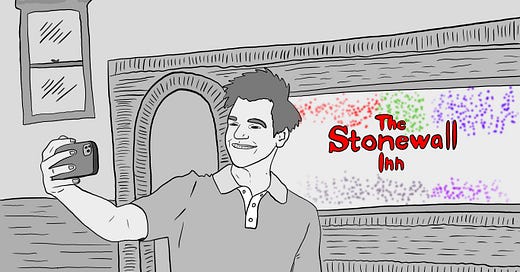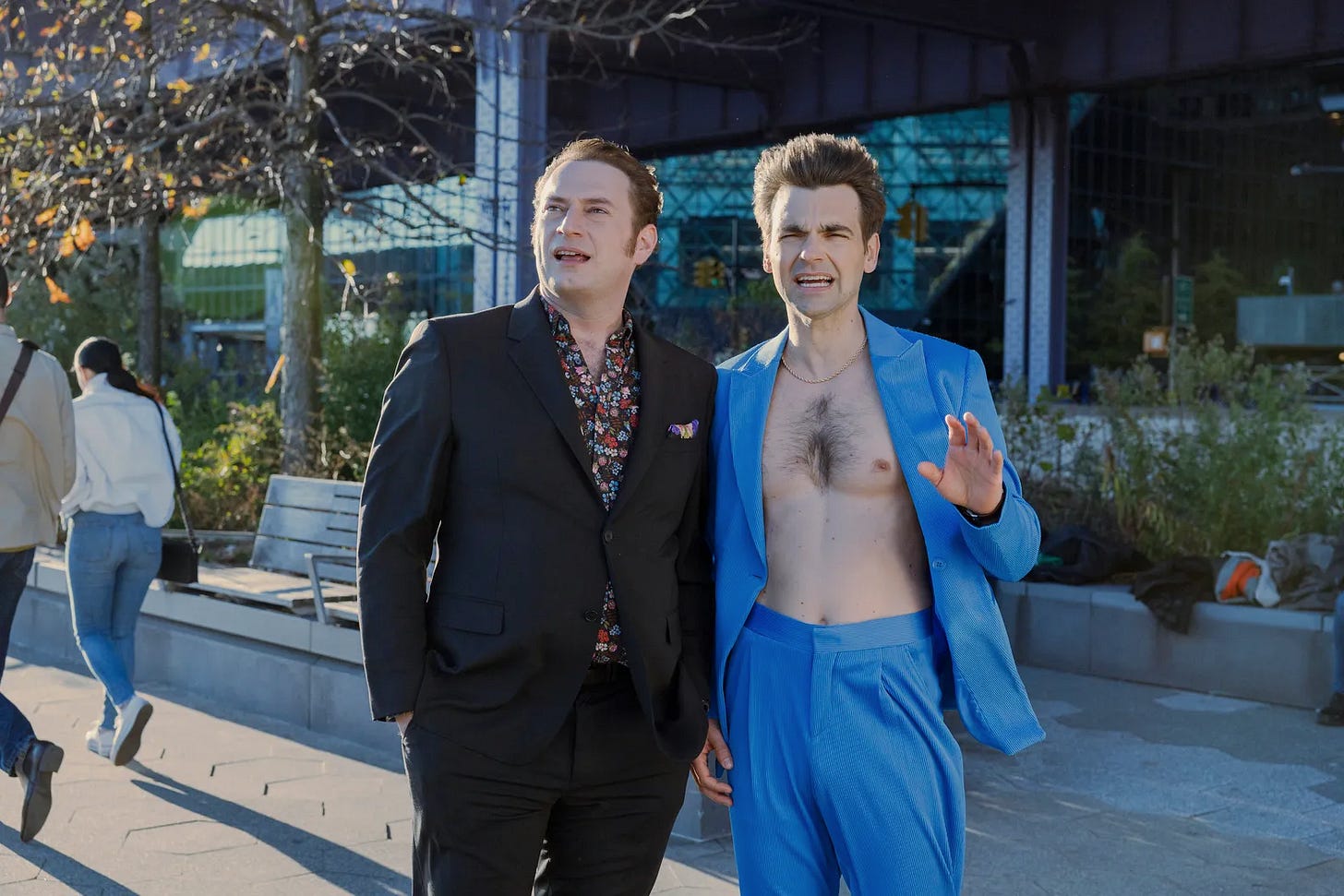The Yearning Rating: ✰✰✰✰
Romance ✰
Sex ✰✰½
Storytelling ✰✰✰✰½
Performance ✰✰✰✰✰
Yearning ✰✰✰✰
Are you gagging for us? Hit the ♥ on this post to prove it!
Light spoilers for HBO’s The Other Two ahead.
Written by Ali Romig
Is it just me, or are most comedies these days actually pretty sad? Maybe this is a consequence of our current collective psyches, or maybe comedies have always just been disguised tragedies and now that I’m older, it’s easier for me to see the glum reality through the laugh-inducing cringe. I’m not sure. But lately, when it comes to TV, the line between laughter and tears has become increasingly thin—if not nonexistent. Season 2, Part 2 of Pen15 (a series beloved by The Yearning) comes to mind. That show always had the power to make me feel incredibly uncomfortable in my own skin, calling forth moments from middle school I’d spent years repressing; but by Season 2, its tone was at times so dark and visceral that it was hard to watch more than one episode in a single sitting. I needed time afterwards to decompress. To be clear, I don’t mean that Pen15 got “bad”. The opposite, really. It remained sharp, poignant, and groundbreaking in how seriously it treated the trials of two tween girls. It just got…so real?
This is the same feeling I have now while watching Season 3 of HBO’s1 The Other Two, which turns its scathing wit on a more seemingly-opulent target than the suffocating world of a middle class suburb: The Entertainment Industry. And while on it’s surface the show seems like a fairly straightforward sendup of “the Industry,” as the third season unfolds it becomes—and please pardon me as I unnecessarily wax philosophic—a confrontation of capitalism and how its corrupting presence snakes its way into everything, even our creative endeavors.
The aforementioned “other two”, Cary and Brooke Dubek, spent the first two seasons struggling to advance their careers from underneath the shadow of their more famous family members. The third season takes a different approach. After finding marked success in their fields (acting and talent management, respectively), how do they contend with the discontent—or even emptiness—that they can’t seem to shake? This is something that has been on my mind a lot recently, as I am sure it has any professional struggling to figure out: “What’s this all for?” As a viewer, I saw this theme thrumming throughout the season, but I don’t think either main character is consciously aware of it, even if they are motivated by it. They fumble from episode to episode, desperately seeking the validation they expected to receive through their work. Success is an ever-moving target, and all that jazz.
If this sounds heavy, that’s because it is! But I also feel the need to make something clear: this show still has the jokes. It’s as charming, biting, and smart as ever. Creators (and former SNL writers) Chris Kelly and Sarah Schneider know these characters so well that even at their most ridiculous, they feel believable. There was a two-year hiatus between Seasons 2 and 3, and while some shows might lose momentum in the lull, The Other Two expertly uses the time jump to their advantage, acknowledging it and even working it into the story.
Season 2 ended on a bit of a jump-scare. Cary (a pitch-perfect Drew Tarver), who had been struggling to find work as an actor for years, finally booked a role as the third lead in a film, Night Nurse. He had to sacrifice relationships to do so, but it was seemingly worth it—his career was finally taking off! But then, he gets word that production starts March 13, 2020. While he is oblivious to what this means, we know: the world is about to shut down. I was a little bit on the fence when I first watched the Season 2 finale. Back in 2021 when it aired, we were still in lockdown, and I had been enjoying watching something that felt separate from all things COVID. I was worried about what this reveal meant for the show, as countless other programs had badly fumbled their COVID storylines. So imagine my delight when I saw that Season 3 picks up three-years later, in the present, as Cary’s movie is finally released to VOD after years of COVID delays.
The subsequent episodes follow Cary as he tries to maintain career momentum after Night Nurse. In the premiere episode, after some thwarted attempts, Cary finally gets his loved ones together to watch his movie. The night goes exactly as he dreamed, even ending with everyone in the room cheering his name. Still, he goes home and gets on Twitter, searching for mentions of himself. Always looking for more, more, more. This twisted need persists and his efforts to remain “booked and busy” become increasingly desperate. Cary ends up sidelining almost every friend he’s got. The closest he gets to real connection in the early episodes comes in the form of a relationship with a Dear Evan Hanson-looking method actor, who is always in character as an unbearably earnest teen.
In the episode ‘Brooke Gets Her Hands Dirty,’ Cary lands a three-episode arc on a long-running police procedural, Emily, Overruled2. The set of the show is run like a factory, with everyone repeatedly reminding Cary that they go home at 5 p.m. When he asks if he can step off his mark during a take, the director and other actors look at him as if he’s just told them he’s got a bomb strapped to his chest. Afterwards, two timid actors show up at his dressing room and question him about “making choices” and “motivation,” which leads to more actors coming to learn from him. At first, it seems like he is genuinely helping them—reminding them that acting should be creative and artistic, not just “a job.” But soon we see Cary’s own, slightly different brand of commercialization seep into his teachings. He tells the actors that they should improv every scene! That actors are the most important part of any production! That they should demand to direct, even if they don’t really want to! He tells them that they need to study Euphoria, and when one of them remarks that it sounds kind of bad, he insists “that’s just what they want you to think!” This perfectly illustrates the kind of layered dysfunction that The Other Two so expertly lampoons.
The other half of the titular “two,” Brooke (Heléne Yorke) isn’t doing much better. At some point during the time jump, she became engaged to her sweet puppy-dog of a boyfriend, Lance (Josh Segarra). Lance quit trying to make it in the fashion industry and became a nurse during the pandemic and Brooke is tired and jealous of all the attention he is getting for “doing good.” To her, it seems like everyone has left the industry to “help others,” even Kate Berlant’s ex-agent character Pitzi Pyle, who was famously gagging for Cary in Season 1. It’s obvious that for many of these ex-Industry do-gooders, helping other is a social currency—much like an invite to the right party used to be.
Propelled by an insatiable need for acceptance and a secret fear that Lance judges her career choice, Brooke quits the Industry to “do good.” What does that mean exactly? Beyond putting #blacklivesmatter in her IG profile and adding “she/her/hers” to her handles, she isn’t sure. Brooke is an incredibly self-absorbed and ignorant character—she’s quite literally made up of what many of us would consider the worst of ourselves—so I really have to give Yorke all the props for making her as watchable as she is. Part of it is that Yorke plays Brooke as someone who is both aware of and defensive about her own flaws. And part of it is that Yorke’s understanding of what makes something funny is unparalleled, whether it’s a perfect line-reading or the physical humor she brings to a scene in which she’s nearly making love to a plate of nachos. She’s also able to bring an explosive amount of emotion to more serious scenes, like an inevitable mid-season confrontation between Brooke and Lance. This moment allows both Yorke and Segarra to shine.
Rounding out the Dubek family are Cary and Brooke’s mom, Pat (Molly Shannon, comedy’s Cate Blanchett) and teen-heartthrob little brother, Chase Dreams (Case Walker). As the more successful members of the family, you’d think their lives would be less pitiful—but celebrity ennui gets even the best of us. By Season 3, Pat is not only a popular talk show host but also the exec of an Oprah-esque TV network. She’s also basically on house arrest. She can’t go anywhere without her security detail for fear of being bombarded by a deranged public. This not only affects her relationship with her kids, but also her romantic relationship with Chase’s sweet, foolish manager, Streeter (Ken Marino). And Chase, recently eighteen, has to contend with hungry Industry-vampires3 who are ready to sell pictures of his “pit” for billions.
Even though this show is so much about the endless comparison game that is modern life, it still manages to find and highlight moments of genuine affection in its central family. Ever since Season 1, the Dubeks and their connection have grounded the show, thanks in large part to the chemistry between all the actors, and that remains a huge part of this season. The Other Two has never been sentimental, but it does have a heart and something to say about the rooting force of family—however you define it.
The Other Two also has a lot to say about queerness. From the very first season, Cary has been a queer character whose identity feels like something he’s still figuring out, coming out late in life and dealing with internalized homophobia. In Season 3, he finally seems more comfortable in his skin (even if he is still tripping up over basic gay cultural staples, like the importance of Survivor), but this personal comfort coincides with his being more and more in the public eye. The show looks at queerness and show business in a way that allows for complexity—when your career literally depends on how other people perceive you, what does that do to your identity? When you are constantly being asked to be “more gay” or “less gay” depending on the role you’re going for, how do you know how to be yourself? Cary’s dynamic with his best friend, Curtis (Brandon Scott Jones) is also especially interesting this season, as they both begin to book roles and have to confront the lack of queer parts available. There are basically three types and three types only—prestige AIDS gay, Christmas rom com gay, and GBBF (who was originally written as a woman).
So yes, The Other Two gets a bit dark this season. But hey! The world is dark—it’s also funny. What makes The Other Two stand out is the same thing that made Pen15 stand out: its ability to look inward and not only make fun of all the ugliness found there, but offer itself a surprising amount of tenderness. I’ll take The Other Two’s realistic perspective on our current opportunist hellscape over other comedies' hollow optimism nine times out of ten.
The Other Two is currently streaming on Max, with new episodes every Thursday.
Get them to the chapel! The Yearning will be taking a two-week summer vacation to celebrate the nuptials of Meg & Gab. Send some love their way and we’ll see you in July ♥
Or is it Max’s? I truly don’t know!
Emily is played by Body of Proof star, Dana Dalney—inspired casting!
The literal vampire teeth are a fun campy addition to these scenes.











J’adored this one!